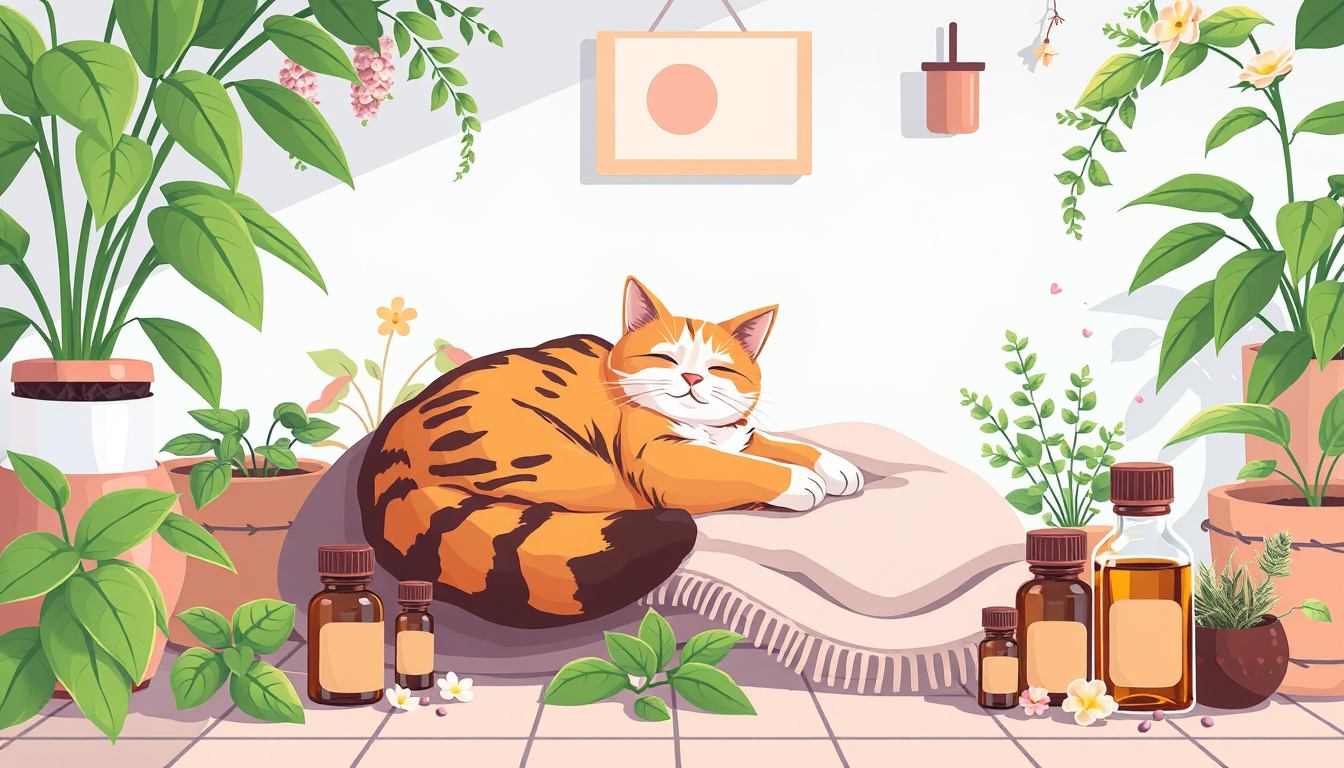Cats are cherished companions, and as pet owners, we constantly seek to ensure their health and well-being. Homeopathy offers a holistic approach to treating our feline friends, using natural remedies that can support their health while minimizing the side effects often associated with conventional medications. In this article, we’ll explore the concept of homeopathic remedies for cats, delve into common ailments they may face, introduce popular homeopathic solutions, and discuss how to effectively administer these treatments. We will also highlight important precautions to keep in mind, ensuring your furry friend receives the best care possible. Whether you're a seasoned cat owner or a new adopter, understanding homeopathic options can empower you to make informed health choices for your beloved pets.
Make your car happy and prevent spraying now!
Key Takeaways
- Homeopathy offers natural solutions to treat various ailments in cats.
- Common health issues in cats can often be addressed with homeopathic remedies.
- Popular homeopathic treatments include remedies for anxiety, digestive issues, and skin disorders.
- Administering homeopathic treatments to cats requires careful consideration and dosage.
- Always consult a veterinarian if your cat's condition does not improve with homeopathic remedies.
Introduction to Homeopathy for Cats
Homeopathy for cats is an increasingly popular approach among pet owners who seek alternative and holistic remedies to support their feline companions' health. Homeopathic remedies for cats are derived from natural substances and are designed to stimulate the body's healing processes without the side effects often associated with conventional medications. These remedies are based on the principle of treating 'like with like,' where a substance that causes symptoms in healthy animals is used to treat those same symptoms in a sick animal when highly diluted. This method promotes overall wellbeing, addressing both physical and emotional health in cats. As more pet owners become aware of the benefits of homeopathy, it's essential to understand the variety of homeopathic remedies available, their applications, and how they can complement traditional veterinary care.
Understanding Common Ailments in Cats
Understanding the common ailments that can affect our feline friends is crucial for any cat owner. From minor issues like allergies and skin irritations to more serious conditions such as diabetes and arthritis, recognizing the signs of illness is the first step in ensuring your cat's health. Many pet owners are increasingly turning to homeopathic remedies for cats as a natural alternative to conventional medications. These remedies often utilize natural ingredients to help alleviate symptoms without the harsh side effects associated with traditional pharmaceuticals. For instance, remedies such as calendula can help soothe skin irritations, while arnica may alleviate pain and reduce inflammation. It is essential, however, to consult a veterinarian before starting any homeopathic approach to ensure it is suitable for your cat's specific needs and conditions. By understanding both the ailments and the potential homeopathic remedies available, you can provide more holistic care for your beloved pet.
'Our pets are like family, and it is our duty to care for them, naturally and lovingly.' - Unknown
Popular Homeopathic Remedies for Cats
Homeopathic remedies for cats have gained popularity among pet owners seeking natural alternatives to conventional veterinary treatments. These remedies operate on the principle of 'like cures like,' focusing on stimulating the cat's own healing abilities. Among the most popular homeopathic remedies is Aconite, often used to alleviate anxiety or stress in cats, particularly after traumatic experiences. Another common remedy is Arnica montana, which is celebrated for its effectiveness in treating bruises, sprains, and post-surgical discomfort. Additionally, Nux vomica can be helpful for cats exhibiting signs of nausea or digestive issues, while Silicea is known for promoting the healing of wounds. It's essential to consult with a veterinarian who is knowledgeable about homeopathy before administering any treatments, ensuring they are appropriate for your feline friend's specific needs. By incorporating these homeopathic remedies for cats, pet owners can provide gentle support for their pets' health and well-being.
Make your car happy and prevent spraying now!
Administering Homeopathic Treatment to Cats
Administering homeopathic treatment to cats can be an effective and natural alternative to traditional veterinary medicine, particularly for pet owners who are seeking holistic approaches for their furry friends. Homeopathic remedies for cats are based on the concept of treating the whole animal by addressing not just the symptoms but the underlying cause of ailments. These remedies are derived from natural substances and are typically prepared using highly diluted solutions, making them safe for even the most sensitive felines. When considering homeopathic treatment for your cat, it’s important to seek advice from a veterinarian who is knowledgeable in homeopathy. They can guide you in selecting the right homeopathic remedies for cats that match your pet's specific health issues, ensuring a tailored and effective treatment plan. Additionally, observing your cat’s behavioral changes and overall wellbeing during the treatment can provide valuable insights into the effectiveness of the remedies, making the homeopathic journey not only a healing process but also a bonding experience between you and your pet.
Precautions and Considerations
When considering homeopathic remedies for cats, it is crucial to take certain precautions and considerations into account. First and foremost, always consult with a veterinarian before starting any homeopathic treatment. Each cat is unique, and what works for one pet may not be suitable for another. Additionally, it's important to ensure that the remedies are specifically formulated for feline use, as human homeopathic products can be harmful to cats. Monitoring your cat for any adverse reactions once a remedy is introduced is also essential; if you notice any negative changes in behavior or health, discontinue use and seek veterinary advice immediately. Furthermore, while homeopathic remedies for cats can provide relief for various ailments such as anxiety, allergies, or minor digestive issues, they should not replace conventional veterinary care for serious health concerns. Understanding the proper dosage and administration of these remedies is key to their effectiveness, so follow guidelines carefully and keep communication open with your veterinarian throughout the treatment process.
Frequently Asked Questions
What are homeopathic remedies for cats?
Homeopathic remedies for cats are natural treatments derived from plants, minerals, and other natural substances. They are formulated in a way that stimulates a cat's immune system to heal itself, addressing various ailments without the side effects commonly associated with conventional medications.
What common ailments can homeopathic remedies help with in cats?
Homeopathic remedies can assist with various common ailments in cats, including allergies, digestive issues, anxiety, skin problems, and respiratory infections. Each remedy targets specific symptoms and conditions, aiming to provide gentle and holistic support.
How do I administer homeopathic remedies to my cat?
Homeopathic remedies for cats can be administered in several forms, such as pellets, liquid dilutions, or powders. It is essential to follow the dosage instructions provided by a homeopathic veterinarian or on the product packaging. You can place the remedy in your cat's mouth, mix it with food, or use it in a dropper if it’s a liquid.
Are there any precautions I should take when using homeopathic remedies for my cat?
Yes, while homeopathic remedies are generally safe, it is important to use high-quality products and consult with a veterinarian knowledgeable in homeopathy before starting any treatment. Be cautious about potential interactions with other medications and monitor your cat for any adverse reactions during treatment.
When should I consult a veterinarian instead of using homeopathic remedies?
If your cat shows severe symptoms, such as prolonged vomiting, difficulty breathing, or extreme lethargy, you should seek veterinary care immediately. Additionally, if there is no improvement in your cat's condition after a few days of treatment or if you are unsure about the appropriate remedy to use, consult a veterinarian.
About
How to stop a cat from spraying offers useful tips and advice on how to stop the undesired and nasty behavior with a fun, proven and effective method that will make your cat love you even more.
Comments
Post a Comment